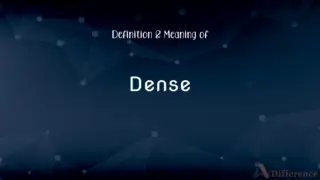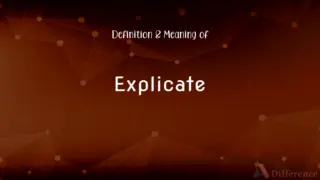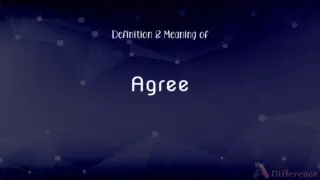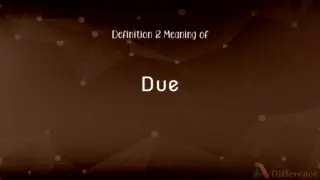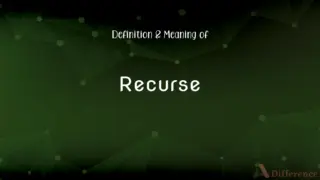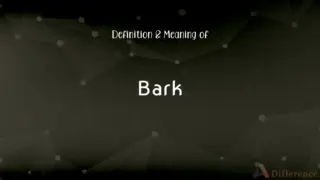Lose Definition and Meaning
Edited by Tayyaba Rehman — By Fiza Rafique — Updated on March 5, 2024
To lose means to no longer have something because it has been taken away or cannot be found. e.g., She was sad to lose her favorite toy.
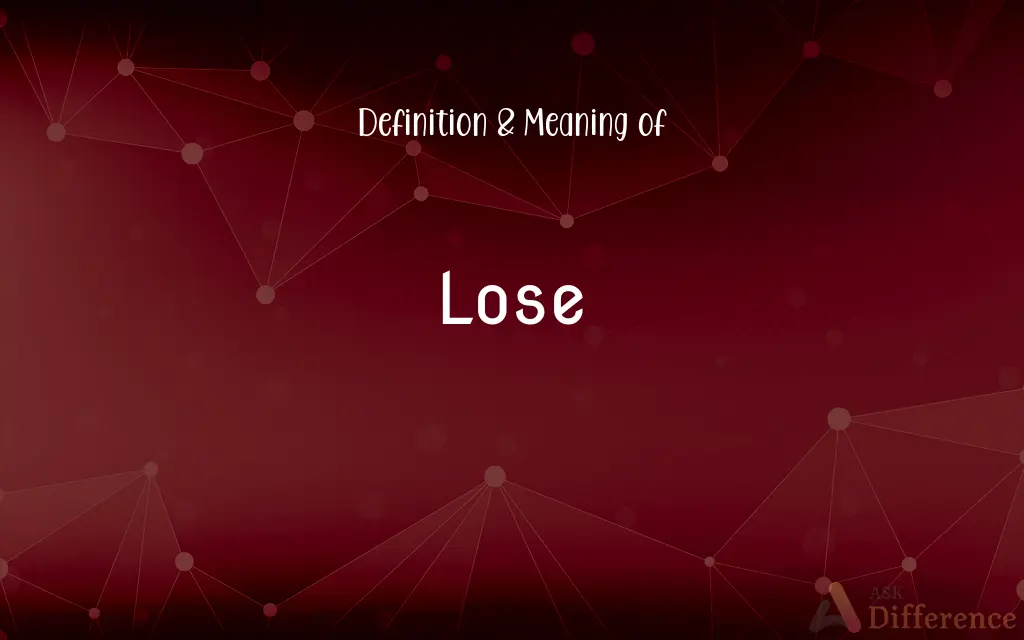
Table of Contents
Lose Definitions
Misplace an Item: Unable to find something because it's not in its expected place.
He always seems to lose his keys.
Be set at a disadvantage;
This author really suffers in translation
Be Defeated: To not win a game or contest.
The team didn't want to lose the championship.
Lose Time: To waste time or fall behind schedule.
We can't afford to lose time on this project.
Waste Opportunity: To fail to use an opportunity effectively.
Don't lose your chance to participate in the competition.
Reduce Weight: To decrease in body weight.
She managed to lose ten pounds in a month.
Lose Interest: To stop being interested in something.
He began to lose interest in playing the violin.
Lose Money: To decrease in financial wealth or resources.
They didn't want to lose money on the investment.
Lose Hope: To become pessimistic or give up hope.
Even in tough times, they didn't lose hope.
Lose Control: To no longer be able to manage or direct something.
The driver lost control of the vehicle on the icy road.
Lose Patience: To become impatient or frustrated.
The teacher never seems to lose patience with her students.
To be unsuccessful in retaining possession of; mislay
He's always losing his car keys.
To be deprived of (something one has had)
Lost her art collection in the fire.
Lost her job.
To be left alone or desolate because of the death of
Lost his wife.
To be unable to keep alive
A doctor who has lost very few patients.
To be unable to keep control or allegiance of
Lost his temper at the meeting.
Is losing supporters by changing his mind.
To fail to win; fail in
Lost the game.
Lost the court case.
To fail to use or take advantage of
Don't lose a chance to improve your position.
To fail to hear, see, or understand
We lost the plane in the fog. I lost her when she started speaking about thermodynamics.
To let (oneself) become unable to find the way.
To remove (oneself), as from everyday reality into a fantasy world.
To rid oneself of
Lost five pounds.
To consume aimlessly; waste
Lost a week in idle occupations.
To wander from or become ignorant of
Lose one's way.
To elude or outdistance
Lost their pursuers.
To be outdistanced by
Chased the thieves but lost them.
To become slow by (a specified amount of time). Used of a timepiece.
To cause or result in the loss of
Failure to reply to the advertisement lost her the job.
To cause to be destroyed. Usually used in the passive
Both planes were lost in the crash.
To cause to be damned.
To suffer loss
Investors who lost heavily on the firm's stock.
To be defeated
Our team lost in overtime.
To operate or run slow. Used of a timepiece.
(transitive) To cause (something) to cease to be in one's possession or capability due to unfortunate or unknown circumstances, events or reasons.
If you lose that ten-pound note, you'll be sorry.
He lost his hearing in the explosion.
She lost her position when the company was taken over.
(transitive) To have (an organ) removed from one's body, especially by accident.
Johnny lost a tooth, but kept it for the tooth fairy.
He lost his spleen in a car wreck.
(transitive) To shed (weight).
I’ve lost five pounds this week.
(transitive) To experience the death of (someone to whom one has an attachment, such as a relative or friend).
She lost all her sons in the war.
(transitive) To give or owe (money) after losing a bet.
To be deprived of access to something.
Users who engage in disruptive behavior may lose their accounts.
To wander from; to miss, so as not to be able to find; to go astray from.
I lost my way in the forest.
(transitive) To fail to win (a game, competition, trial, etc).
We lost the football match.
You just lost The Game.
(transitive) To be unable to follow or trace (somebody or something) any longer.
The policeman lost the robber he was chasing.
Mission control lost the satellite as its signal died down.
(transitive) To cause (somebody) to be unable to follow or trace one any longer.
We managed to lose our pursuers in the forest.
(transitive) To cease exhibiting; to overcome (a behavior or emotion).
To shed, remove, discard, or eliminate.
When we get into the building, please lose the hat.
Of a clock, to run slower than expected.
My watch loses five minutes a week.
It's already 5:30? My watch must have lost a few minutes.
(ditransitive) To cause (someone) the loss of something; to deprive of.
To fail to catch with the mind or senses; to miss.
I lost a part of what he said.
(obsolete) Fame, renown; praise.
To part with unintentionally or unwillingly, as by accident, misfortune, negligence, penalty, forfeit, etc.; to be deprived of; as, to lose money from one's purse or pocket, or in business or gaming; to lose an arm or a leg by amputation; to lose men in battle.
Fair Venus wept the sad disasterOf having lost her favorite dove.
To cease to have; to possess no longer; to suffer diminution of; as, to lose one's relish for anything; to lose one's health.
If the salt hath lost his savor, wherewith shall it be salted?
Not to employ; to employ ineffectually; to throw away; to waste; to squander; as, to lose a day; to lose the benefits of instruction.
The unhappy have but hours, and these they lose.
To wander from; to miss, so as not to be able to and; to go astray from; as, to lose one's way.
He hath lost his fellows.
To ruin; to destroy; as destroy; as, the ship was lost on the ledge.
The woman that deliberates is lost.
To be deprived of the view of; to cease to see or know the whereabouts of; as, he lost his companion in the crowd.
Like following life thro' creatures you dissect,You lose it in the moment you detect.
To fail to obtain or enjoy; to fail to gain or win; hence, to fail to catch with the mind or senses; to miss; as, I lost a part of what he said.
He shall in no wise lose his reward.
I fought the battle bravely which I lost,And lost it but to Macedonians.
To cause to part with; to deprive of.
How should you go about to lose him a wife he loves with so much passion?
To prevent from gaining or obtaining.
O false heart! thou hadst almost betrayed me to eternal flames, and lost me this glory.
In the excitement of such a discovery, many scholars lost their heads.
To suffer loss, disadvantage, or defeat; to be worse off, esp. as the result of any kind of contest.
We 'll . . . hear poor roguesTalk of court news; and we'll talk with them too,Who loses and who wins; who's in, who's out.
Fail to keep or to maintain; cease to have, either physically or in an abstract sense;
She lost her purse when she left it unattended on her seat
Fail to win;
We lost the battle but we won the war
Suffer the loss of a person through death or removal;
She lost her husband in the war
The couple that wanted to adopt the child lost her when the biological parents claimed her
Place (something) where one cannot find it again;
I misplaced my eyeglasses
Miss from one's possessions; lose sight of;
I've lost my glasses again!
Allow to go out of sight;
The detective lost the man he was shadowing after he had to stop at a red light
Fail to make money in a business; make a loss or fail to profit;
I lost thousands of dollars on that bad investment!
The company turned a loss after the first year
The company has not profited from the merger
Fail to get or obtain;
I lost the opportunity to spend a year abroad
Retreat
Fail to perceive or to catch with the senses or the mind;
I missed that remark
She missed his point
We lost part of what he said
Lose Snonyms
Forfeit
To lose or be deprived of (property or a right or privilege) as a penalty for wrongdoing.
The team had to forfeit the match due to a rule violation.
Deplete
To use up the supply or resources of.
The illness depleted his energy reserves.
Misplace
To put in the wrong place and forget where one has put something.
She often misplaces her keys.
Concede
To admit that something is true or valid after first denying or resisting it; also to give up (a point in a game, etc.).
He conceded defeat in the election.
Squander
To waste (something, especially money or time) in a reckless and foolish manner.
He squandered his inheritance on frivolous things.
Relinquish
To voluntarily cease to keep or claim; to give up.
She relinquished control of the business.
Discard
To get rid of (someone or something) as no longer useful or desirable.
Discard old clothes that you no longer wear.
Shed
To get rid of (something unwanted or unnecessary).
He's been trying to shed some weight.
Surrender
To give up or hand over (a person, right, or possession), typically on compulsion or demand.
He surrendered his passport to the authorities.
Divest
To rid oneself of something that one no longer wants or requires, such as a business interest or investment.
The company divested itself of its overseas operations.
Lose Idioms & Phrases
Lose face
To be embarrassed or to lose respect.
He lost face when he was caught cheating on the test.
Lose steam
To start strong but then begin to falter.
The campaign started with enthusiasm but quickly lost steam.
Lose the plot
To become confused or irrational.
After several sleepless nights, she started to lose the plot.
Lose one's head
To become very upset or angry.
In the heat of the argument, he lost his head and said things he later regretted.
Lose ground
To become less successful compared to others.
After the scandal, the politician began to lose ground in the polls.
Lose track of time
To be unaware of how much time has passed.
I was so engrossed in the book that I lost track of time.
Lose touch
To stop communicating with someone and not stay informed about their life.
We used to be close, but we lost touch over the years.
Lose one's bearings
To become disoriented or confused about one’s location or direction.
In the dense forest, it’s easy to lose one’s bearings.
Lose sleep over
To worry about something to the point of losing sleep.
It's a difficult situation, but it's not worth losing sleep over.
Lose sight of
To forget about an important aspect or goal.
In pursuit of profit, it's important not to lose sight of our ethical standards.
Lose favor
To become less popular or respected.
The policy lost favor with the public once its implications were fully understood.
Lose one's cool
To become angry or agitated.
The manager lost his cool when he saw the mess in the warehouse.
Lose heart
To become discouraged.
After several failed attempts, he began to lose heart.
Lose one's nerve
To become too frightened to do something.
He wanted to ask for a raise but lost his nerve at the last minute.
Lose the race against time
To fail to do something quickly enough.
Despite their best efforts, they lost the race against time to save the endangered species.
Lose one's appetite
To lose desire to eat.
The thought of having to go back to that job makes me lose my appetite.
Lose count
To forget the number of things when counting.
There were so many errors in the document, I lost count.
Lose the thread
To forget what one was talking or thinking about.
She lost the thread of her argument halfway through the presentation.
Lose one's grip
To become less competent or lose control over a situation.
As the company grew, the founder felt he was losing his grip on its direction.
Lose oneself in
To become completely absorbed or engrossed in something.
She lost herself in the music, forgetting all her troubles.
Lose Example Sentences
You shouldn't lose sight of your goals.
It's easy to lose track of time when you're having fun.
If you're not careful, you might lose your ticket.
I hope I don't lose this game.
She was determined not to lose her place in the book.
He didn't lose faith in his abilities, despite the setbacks.
I don't want to lose any of these precious memories.
They were afraid of losing the match.
You'll lose the opportunity if you don't act now.
Don't lose heart if you don't succeed at first.
It's important not to lose balance while riding a bike.
It's sad to lose a friend over a misunderstanding.
I always lose my sense of direction in this city.
The company is at risk of losing a lot of money this quarter.
She tried not to lose her temper during the debate.
Common Curiosities
Why is it called lose?
"Lose" comes from the Old English "losian," meaning to become lost or perish, reflecting the concept of no longer having something or failing to win.
How do we divide lose into syllables?
Being a single syllable word, "lose" is not divided into syllables.
What is a stressed syllable in lose?
Since "lose" has only one syllable, that syllable is stressed by default.
How is lose used in a sentence?
I'm always careful not to lose my keys.
How many syllables are in lose?
There is one syllable in "lose."
What is the verb form of lose?
"Lose" itself is the base form of the verb.
What is the root word of lose?
The root of "lose" is from the Old English "losian," which means to lose or destroy.
What is the first form of lose?
The first form (base form) of "lose" is "lose."
What is the opposite of lose?
The opposite of "lose" could be "find" or "win."
Is lose an abstract noun?
"Lose" is not a noun; it is a verb. Therefore, it cannot be an abstract noun.
What is the second form of lose?
The second form (simple past) of "lose" is "lost."
Which determiner is used with lose?
Determiners are not typically used directly with verbs like "lose." Determiners are used with nouns.
Which vowel is used before lose?
The vowel used before "lose" depends on the preceding word and its grammatical structure, not on "lose" itself.
What is the pronunciation of lose?
"Lose" is pronounced as /luːz/ in American English.
What part of speech is lose?
"Lose" is a verb.
Is lose an adverb?
No, "lose" is not an adverb.
Is lose a negative or positive word?
"Lose" generally has a negative connotation, as it implies a loss or failure.
Is the word “lose” a Direct object or an Indirect object?
"Lose" is a verb and thus cannot serve as a direct or indirect object. However, it can take direct objects, such as "lose a game."
What is the plural form of lose?
As a verb, "lose" does not change form for plural subjects; it remains "lose."
Is lose a vowel or consonant?
The word "lose" starts with a consonant sound, "l."
Which preposition is used with lose?
Prepositions such as "to" and "in" can be used with "lose," depending on the context, e.g., "lose to an opponent," "lose in a competition."
What is the third form of lose?
The third form (past participle) of "lose" is "lost."
What is another term for lose?
Another term for "lose" could be "misplace" or "forfeit."
What is the singular form of lose?
As a verb, "lose" does not have a singular or plural form; it remains "lose."
Is lose a countable noun?
"Lose" is not a noun; it is a verb, so the concept of being countable does not apply.
Is the word lose imperative?
"Lose" can be used in the imperative form as a command, such as "Don't lose focus."
Which conjunction is used with lose?
Any conjunction can be used with "lose" as appropriate for the sentence structure, such as "and," "but," or "or."
Is lose a noun or adjective?
"Lose" is a verb, not a noun or adjective.
Is lose a collective noun?
No, "lose" is a verb and not a noun.
Is the lose term a metaphor?
"Lose" can be used metaphorically in various contexts, such as losing one's mind, meaning to become very agitated or angry.
Is the word lose Gerund?
The gerund form of "lose" is "losing."
Which article is used with lose?
Articles are not typically used directly with verbs like "lose." Articles are used with nouns.
Share Your Discovery
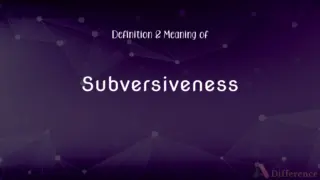
Previous Term
Subversiveness Definition and Meaning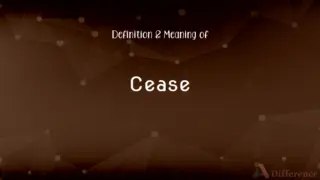
Next Term
Cease Definition and MeaningAuthor Spotlight
Written by
Fiza RafiqueFiza Rafique is a skilled content writer at AskDifference.com, where she meticulously refines and enhances written pieces. Drawing from her vast editorial expertise, Fiza ensures clarity, accuracy, and precision in every article. Passionate about language, she continually seeks to elevate the quality of content for readers worldwide.
Edited by
Tayyaba RehmanTayyaba Rehman is a distinguished writer, currently serving as a primary contributor to askdifference.com. As a researcher in semantics and etymology, Tayyaba's passion for the complexity of languages and their distinctions has found a perfect home on the platform. Tayyaba delves into the intricacies of language, distinguishing between commonly confused words and phrases, thereby providing clarity for readers worldwide.











